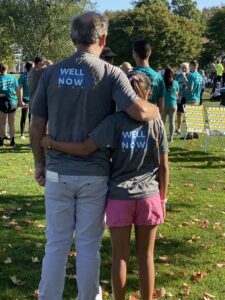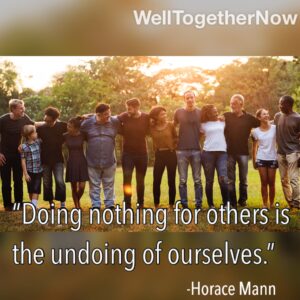The best way to not feel hopeless is to get up and do something. Don’t wait for good things to happen to you. If you go out and make some good things happen,
you will fill the world with hope; you will fill yourself with hope.
-Barack Obama
Pay It Forward. Spread Kindness. Make a difference; be the difference.
There are countless ways to encourage the effort, but without follow through the words fall flat. Given all of the significant leaders and mentors who have shined the light on the reciprocal benefits of joining in and giving back, this should be at the front line of our wellness goals. As the evidence continues to grow, more medical professionals call attention to the under-appreciated social dimensions of health. Ergo, in this Coach’s Corner, let’s connect on the importance of connectedness.
 Connectedness refers to the need, and want, to be a meaningful part of something: a group, a family, something greater than self. (1) In other words, connectedness is the genuine experience of human interaction.
Connectedness refers to the need, and want, to be a meaningful part of something: a group, a family, something greater than self. (1) In other words, connectedness is the genuine experience of human interaction.
Actions that inspire connectedness reach us physically, mentally, and emotionally to improve overall wellbeing. While not a cure-all, we should thoughtfully consider this potential.
One might think, in this age of “tech-connectivity,” that this would come more readily. Instead, we face a stressful trifecta:
- the pressure to keep up with appearances
- constant access with no respite
- less face time and decreased time spent outdoors
For too many, especially the younger generation, the combination creates a perfect storm. Rates of depression and anxiety are on the rise.
In this technological tempest, many of us are at our loneliest. And loneliness has been shown to have adverse health effects at a similar rate to more apparent negative health behaviors such as smoking. (2) In contrast, positive social interactions are known to reduce stress. While spending time in nature has been shown to boost the immune system. (2)
Some in psychology recognize the need for change. The potency of connectedness has led to the study and practice of social prescribing as part of a comprehensive approach to treating some mental health conditions.
That said, technology is not without merit. It can and should play a role in extending our community and establishing a sense of rapport that may otherwise be abbreviated. Still, face-to-face contact and interaction with others are vital to our health. It is in the balance of these assets that we find the most value.

In the heart of connectedness lives the practice of giving back. Positive reciprocity: in lifting others, we lift ourselves. Through volunteerism, we develop a more profound sense of purpose. These fulfilling encounters, in return, improve our wellbeing.
Volunteerism is a commitment and will require a change in schedule and routine. BE PASSIONATE AND MINDFUL. You aren’t doing well by yourself or others if you overcommit. If you are considering adding to your calendar, remember to be realistic about what you can manage given your current circumstances and set yourself up for success.
Connectedness is central to my mission with Well Together Now. With the launch of our new site on the horizon, I am excited to promote and facilitate opportunities for connected experiences. With that, here are some resources and tips for getting involved:
QUICK advice for getting started. Just as with any goal, make it SMART.
- Be Specific with the details. (Where? When?)
- Set benchmarks for Measurability (Track your accomplishments and hold yourself accountable.)
- Make it Achievable. (Be realistic about the commitments required for participation.)
- Choose something Relevant. (If the charity or opportunity is meaningful to YOU, then you will have higher levels of motivation and stick-to-itiveness.)
- Time–based (Set parameters for this goal and obligation. Think time and frequency: How often and for how long?)
Websites to help find opportunities:
https://www.volunteermatch.org/
Be it a voice in the conversation or common interest in our mission; a WELLcommunity starts with you. Follow us and subscribe to stay connected.
Take care & be well,
Coach Dawn
(1) Deak, JoAnn. Ph.D. How Girls Thrive: Revised and Expanded Edition. Green Blanket Press, 2010.
(2) Harding, Kelli. MD, MPH. The Rabbit Effect: Live Longer, Happier, and Healthier with the Groundbreaking Science of Kindness. Atria Books, August 27, 2019.
